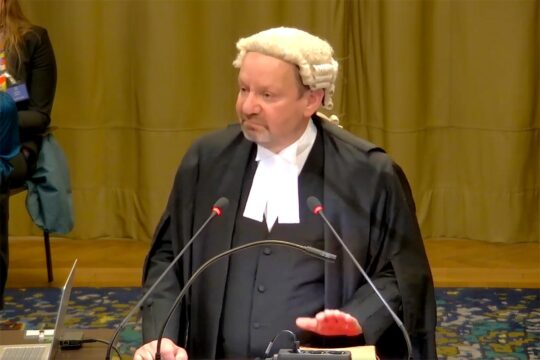Uwinkindi, 62, is charged with genocide and crimes against humanity. He is accused of having Tutsi members of his Kazenze parish in eastern Rwanda massacred in 1994. The Prosecutor says he was one of the main organizers of massacres in that region, where he was head of his church. Arrested on June 30, 2010 in Uganda and transferred to the ICTR Detention Facility in Arusha, Tanzania, two days later, he has continued ever since to protest his innocence.
Constitutional Challenge
In the past week, Uwinkindi has appeared three times before courts in Rwanda, but his much awaited trial has yet to get started. On Monday he appeared twice, accompanied by his lawyer Gatera Gashabana, a former president of the Kigali Bar. First he appeared before the Supreme Court, the highest in Rwanda, in connection with a defence request challenging the constitutionality of the proceedings. The Supreme Court postponed examination of the request until next Monday (January 21), to give the parties time to exchange certain documents.
The same day the pastor, having exchanged his dog collar for a pink Rwandan prisoners’ uniform, also appeared before the High Court, the second highest in the land. The schedule of the Chamber, presided by Judge Alice Rulisa, bore the inscription “Start of Trial”. But lawyer Gashabana immediately requested that the trial be postponed, pending the decision of the Supreme Court. On Tuesday the High Court heard the arguments of both sides concerning the request for a suspension of the trial. In their decision the next day, the judges granted the defence request and postponed the trial until further notice.
In a telephone interview from Kigali, lawyer Gashabana welcomed the decision but declined to elaborate on his request before the Supreme Court. He said it had yet to be made public. “I will have the opportunity to argue it in public on Monday,” he said, “and to put forward the defence arguments in detail.” Gashabana explained only that he is challenging the constitutionality of the law on the transfer of accused persons from the ICTR and third countries, which forms the legal basis for the prosecution of Uwinkindi. The Supreme Court is the only judicial body in Rwanda that can decide on this type of challenge.
No Blank Cheque
Approved by an ICTR Referral Chamber on June 28, 2011, and confirmed by an Appeals Chamber on December 16 the same year, Uwindkindi’s transfer to Rwanda was carried out only in April 2012, after a long legal battle. The transfer is in line with the closure strategy of the ICTR, which must finish all its work by the end of 2014. It is not, however, a blank cheque for Rwanda. According to the ICTR decisions, judicial procedures in Uwinkindi’s case and his conditions of detention are to be monitored by the Tribunal or, after its closure, by the UN’s Mechanism for International Criminal Tribunals. The ICTR transfer decision provided that monitoring would be carried out by the African Commission on Human and People’s Rights (ACHPR). However, since negotiations with this African Union body were taking too long, the ICTR decided to designate two members of its own staff, who have already filed several reports. In one report last October, ICTR monitor Anees Ahmed reflected the concerns of defence counsel Gashabana and his deputy that they had not received from the government the necessary funds for their defence. Rwandan Attorney General Martin Ngoga responded that the funds were available, and that the defence should submit their requirements to the judges.
ER/JC



